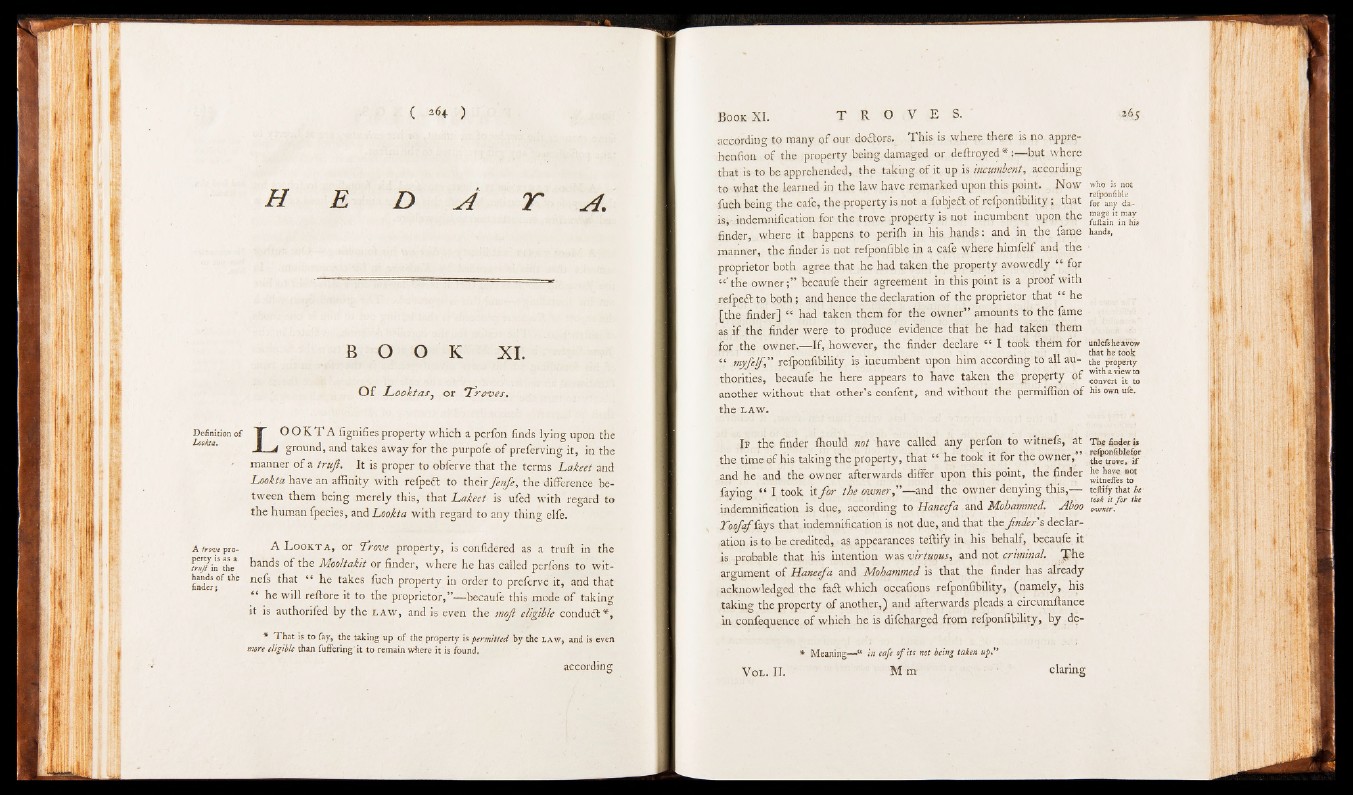
Definition o f
Lookta.
A trove property
is as a-
truji in the
hands o f the
finder;
H E D J r A.
B O O K XI.
Of Looktas, or Troves.
LO O K T A lignifies property which a perfon finds lying upon the
ground, and takes away for the purpofe of preferving it, in the
manner of a truji. It is proper to obferve that the terms Lakeet and
Lookta have an affinity with refpefl to their fenfe, the difference between
them being merely this, that Lakeet is ufed with regard to
the human fpecies, and Lookta with regard to any thing elfe.
A Lookta, or Lrove property, is confidered as a trull in the
hands of the Mooltakit or finder, where he has called perlons to wit-
nefs that “ he takes fuch property in order to preferve it, and that'
“ he will reflore it to the proprietor,”—becaufe this mode of taking
it is authorifed by the law, and is even the moji eligible conduit*,
* T h a t is to fay, the taking up o f the property is permitted b y the l a w , and is even
mere eligible than fuffering'it to remain where it is found.
accordini
according to many of our doctors. This is where there is no appre-
henfion of the property being damaged or deflroyed * but where
that is to be apprehended, the taking of it up is incumbent, according
to what the learned in the law have remarked upon this point. Now
fuch being the cafe, the property is not a fubjeft of refponfibility; that
is, indemnification for the trove property is not incumbent upon the
finder, where it happens to perifh in his handK and in the fame
manner, the finder is not refponfible in a cafe where himlelf and the
proprietor both agree that he had taken the property avowedly “ fqr
“ the owner;” becaufe their agreement in this point is a proof with
refpedt to both; and hence the declaration of the proprietor that “ he
[the finder] “ had taken them for the owner” amounts to the fame
as if the finder were to produce evidence that he had taken them
for the owner.— If, however, the finder declare “ I took them for
“ m yfelff refponfibility is incumbent upon him according to all authorities,
becaufe he here appears to have taken the property of
another without that other’s confent, and without the permiffiori of
the law.
If the finder ffiould not have called any perfon to witnefs, at
the time of his taking the property, that “ he took it for the owner,”
and he and the owner afterwards differ upon this point, the finder
faying “ I took it fo r the owner,”—-and the owner denying this,—
indemnification is due, according to Haneefa and Mohapttied. Aboo
ToofafHys that indemnification is not due, and that the finders, declaration
is to be credited, as appearances teflify in his behalf, becaufe it
is probable that his intention was virtuous, and not criminal, (fhe
argument of Haneefa and Mohammed is that the finder has already
acknowledged the fa£t which occafions refponfibility, (namely, his
taking the property of another,) and afterwards pleads a circumflance
in confequence of which he is difeharged from refponfibility, by de-
* Meaning— “ in cafe o f its not being taken up."
Vol. II. M m ■ • daring
who is not
refponfible
for any damage
it may
fuftain in his
hands,
unlefsheavow
that he toofe;
the property
with a view to
convert it to
his own uie.
The finder i*
refponfible for
the trove, i f
he have not
witn efles to
teftify that he
took it for the
owner.